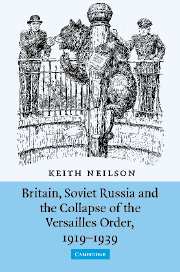Book contents
- Frontmatter
- Contents
- Acknowledgements
- List of abbreviations
- Introduction
- 1 The period of persuasion: British strategic foreign policy and Soviet Russia, 1919–1933
- 2 1933–1934: parallel interests?
- 3 A clash of sensibilities: January to June 1935
- 4 Complications and choices: July 1935–February 1936
- 5 Soviet Russian assertiveness: February 1936–July 1937
- 6 Chamberlain's interlude: May 1937–September 1938
- 7 Chamberlain as Buridan's ass: October 1938–September 1939
- Conclusion
- Appendix I
- Appendix II
- Appendix III
- Bibliography
- Index
Introduction
Published online by Cambridge University Press: 18 July 2009
- Frontmatter
- Contents
- Acknowledgements
- List of abbreviations
- Introduction
- 1 The period of persuasion: British strategic foreign policy and Soviet Russia, 1919–1933
- 2 1933–1934: parallel interests?
- 3 A clash of sensibilities: January to June 1935
- 4 Complications and choices: July 1935–February 1936
- 5 Soviet Russian assertiveness: February 1936–July 1937
- 6 Chamberlain's interlude: May 1937–September 1938
- 7 Chamberlain as Buridan's ass: October 1938–September 1939
- Conclusion
- Appendix I
- Appendix II
- Appendix III
- Bibliography
- Index
Summary
Contrary to Sellar and Yeatman's famous concluding quip in 1066 and All That, the end of the Great War did not mean that ‘History came to a full.’ Given that Great Britain was a sated Power even before 1914, this was perhaps unfortunate, for any change to the status quo was likely to threaten Britain's global position. To deal with this, British policy makers in the inter-war period concerned themselves with maintaining the settlements reached in the years from 1919 to 1923 and ensuring that any changes to policy were achieved by negotiation rather than by force. However, British policy experienced a failure of great expectations, and war broke out again a generation later. This study is an attempt to explain why this failure happened.
The method employed here is to make a detailed examination of Britain's policy towards Soviet Russia in the period from 1919 to 1939. This approach needs clarification and amplification. This book is designed to do two things. First, it aims to fill a gap in the existing literature concerning Britain's relations with Soviet Russia. However, it is intended to be more than that, for if it dealt with only purely Anglo-Soviet matters it would be a thin text. One of the significant points about relations between London and Moscow in the inter-war period is that they were so limited.
- Type
- Chapter
- Information
- Publisher: Cambridge University PressPrint publication year: 2005
- 1
- Cited by

